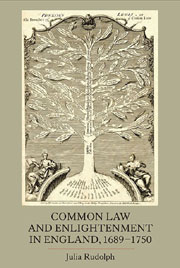Book contents
- Frontmatter
- Contents
- Acknowledgements
- Abbreviations
- 1 Against Decline
- 2 Law Books, Legal Knowledge and Enlightened Encyclopedism
- 3 Expertise and Evidentiary Practices in Science and Law
- 4 Common Law, Credit and the Growth of Commerce
- 5 Common Law Jurisprudence and the Philosophy of Natural Law
- 6 Common Law and the Morality of Markets
- 7 Legal Histories and Enlightened Historiography
- Conclusion
- Bibliography
- Index
- STUDIES IN EARLY MODERN CULTURAL, POLITICAL AND SOCIAL HISTORY
3 - Expertise and Evidentiary Practices in Science and Law
Published online by Cambridge University Press: 05 May 2013
- Frontmatter
- Contents
- Acknowledgements
- Abbreviations
- 1 Against Decline
- 2 Law Books, Legal Knowledge and Enlightened Encyclopedism
- 3 Expertise and Evidentiary Practices in Science and Law
- 4 Common Law, Credit and the Growth of Commerce
- 5 Common Law Jurisprudence and the Philosophy of Natural Law
- 6 Common Law and the Morality of Markets
- 7 Legal Histories and Enlightened Historiography
- Conclusion
- Bibliography
- Index
- STUDIES IN EARLY MODERN CULTURAL, POLITICAL AND SOCIAL HISTORY
Summary
Scientific and medical books, like law books, proliferated in the early eighteenth century. This ‘ocean of books’ had also begun to swell in the late sixteenth and seventeenth centuries, with the advent of printing and the establishment of the Royal Society, but took on certain characteristic forms in the eighteenth century. For example periodicals, like the Royal Society's Philosophical Transactions, became a favoured and flourishing medium for circulating new research and information. In addition large, expensive, multivolume reference works were produced, again with the approval or even encouragement of an authoritative body like the Royal Society whose printer in the 1690s, Samuel Smith, pioneered methods that made publication and distribution of such volumes affordable and even profitable. Both law books and science books and journals benefited from such kinds of official support even though Britain's was an unregulated printing regime after 1695. Beyond such official or corporate control, more modest vernacular medical books formed a third, and very popular, mode of publication of natural knowledge in this period. These medical books became an important means by which a wide range of practitioners established a reputation by offering their own techniques and remedies in print. Such popular texts were consulted by other practitioners, including members of the College of Physicians and of the Royal Society, as well as by ordinary readers who sought advice on self-diagnosis and recipes for useful cures.
- Type
- Chapter
- Information
- Common Law and Enlightenment in England, 1689-1750 , pp. 83 - 129Publisher: Boydell & BrewerPrint publication year: 2013

